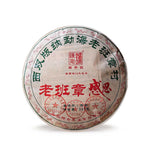Tea for Sore Throat
Tea provides a range of benefits for a sore throat, including antioxidant properties, anti-inflammatory effects, soothing qualities, and hydration benefits. Each of these aspects contributes to alleviating discomfort and promoting recovery.
Antioxidant Properties
Tea is rich in antioxidants such as catechins and flavonoids, which help protect cells from damage by free radicals. These compounds support your immune system, aiding in the prevention and recovery from infections that can cause a sore throat.
Different types of tea, like green and black tea, contain varying levels of antioxidants. By drinking these teas, you can help reduce the oxidative stress on your throat tissue, potentially speeding up healing.
Bestsellers
Anti-Inflammatory Effects
Certain teas possess strong anti-inflammatory properties. Chamomile tea, for example, contains compounds that can reduce inflammation and may help decrease swelling and irritation in the throat. Turmeric tea, with its active ingredient curcumin, also offers anti-inflammatory benefits.
When you consume these teas, the anti-inflammatory agents work to soothe inflamed tissues, providing relief from pain and discomfort associated with a sore throat. Regular intake can help maintain these effects over time.
Soothing Qualities
The warmth and steam from a hot cup of tea can provide immediate relief to your sore throat. Herbal teas like peppermint and ginger are particularly effective. Peppermint contains menthol, which acts as a natural decongestant and provides a cooling sensation.
Ginger tea can help to alleviate throat pain with its warming effects and is known for its anti-nausea properties. These soothing qualities make tea a comforting remedy for throat discomfort.
Hydration Benefits
Staying hydrated is crucial when you have a sore throat, and tea can contribute significantly to your fluid intake. Drinking warm tea encourages you to hydrate, which helps keep your throat moist and aids in the thinning of mucus.
Choosing caffeine-free options, such as herbal teas, can be more beneficial in preventing dehydration. This ensures that you maintain adequate hydration levels, which is essential for recovery.
Types of Tea for Sore Throat
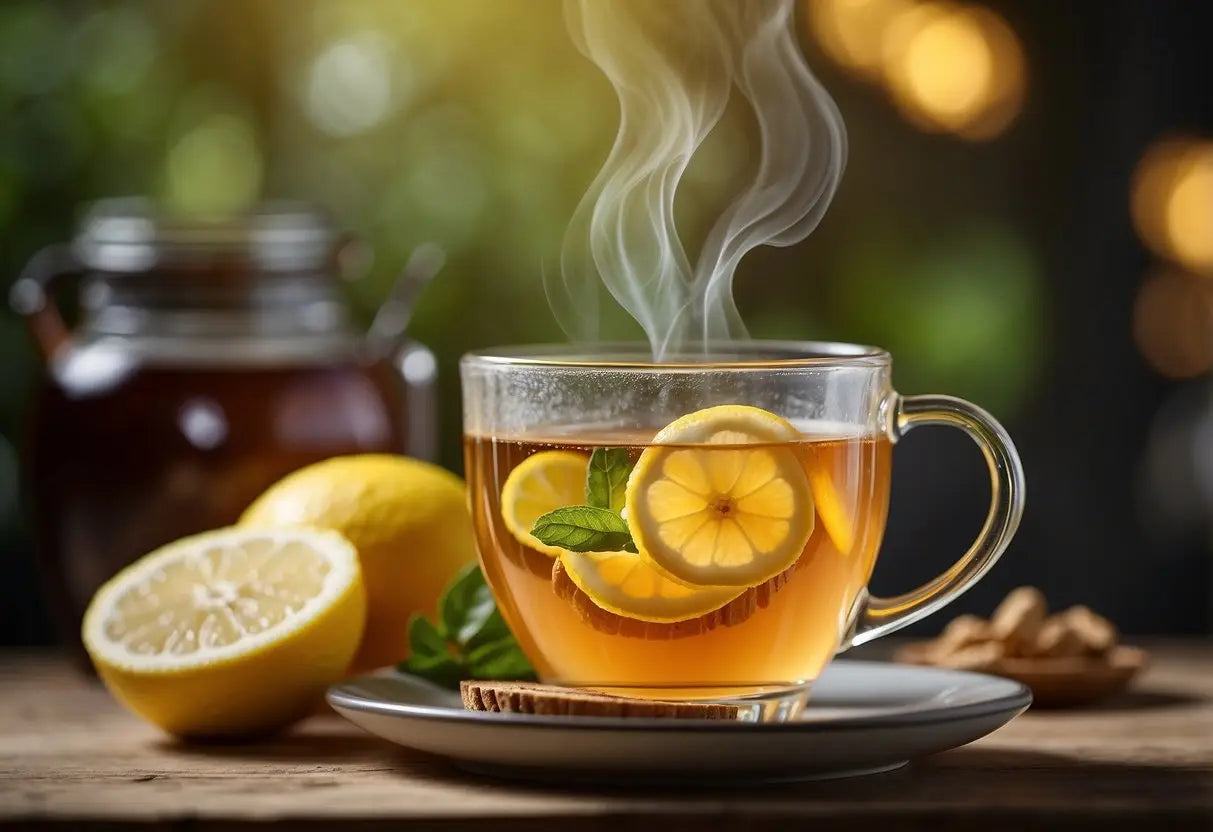
Different types of tea can help soothe a sore throat. Each type offers its own unique benefits, ranging from calming effects to anti-inflammatory properties.
Herbal Teas
Herbal teas like chamomile, peppermint, and licorice root are popular for soothing sore throats. Chamomile is known for its calming effects and anti-inflammatory properties. Peppermint tea can provide a cooling sensation and help numb the throat. Licorice root tea can coat the throat and reduce irritation. Important tip: Make sure the herbal tea is caffeine-free to avoid any added irritation.
Green Tea
Green tea contains antioxidants called catechins that help fight off infections. It has anti-inflammatory properties that can reduce throat pain and swelling. Gargling with green tea can provide immediate relief. It also contains natural compounds that support the immune system. Key point: Opt for decaffeinated green tea if you are sensitive to caffeine.
Black Tea
Black tea has natural tannins that can reduce inflammation and pain. It also has antibacterial properties that may help fight off the infection causing the sore throat. Drinking black tea can provide a comforting warm sensation. Note: Black tea does contain caffeine, so limit your intake if you are trying to rest.
Ginger Tea
Ginger tea is known for its anti-inflammatory and antibacterial properties. The ginger's natural compounds help soothe throat irritation and reduce inflammation. Ginger tea can also help with other symptoms like nausea and congestion. Tip: Adding a bit of honey to ginger tea can enhance its throat-soothing properties.
Lao Ban Zhang
Chamomile Tea
Chamomile tea is particularly beneficial for its calming and anti-inflammatory effects. It can help you relax and fall asleep, which is crucial for recovery. The tea’s natural compounds can reduce throat swelling and pain. Advice: Ensure you steep the chamomile tea long enough to extract all its beneficial properties.
Preparation and Brewing Techniques
When preparing tea for a sore throat, focus on steeping it correctly, ensuring the water temperature is right, and adding natural sweeteners. Additional enhancements like lemon or honey can also boost its soothing properties.
Steeping Tips
Steeping your tea properly is essential for extracting the beneficial compounds. Use fresh, clean water and heat it until it reaches the appropriate temperature for the type of tea you are using.
General steeping times for common teas:
- Green Tea: 2-3 minutes
- Black Tea: 3-5 minutes
- Herbal Tea: 5-7 minutes
Cover your tea while it steeps to retain heat and maximize infusion. Avoid over-steeping as it can lead to a bitter taste which may aggravate a sore throat.
Ideal Water Temperature
The temperature of the water used for brewing tea can significantly affect both flavor and potency. Using water that is too hot can scorch delicate leaves, while water that's too cool may not adequately extract the flavors and health benefits.
Recommended temperatures:
- Green Tea: 160-180°F (70-80°C)
- Black Tea: 200-212°F (93-100°C)
- Herbal Tea: 212°F (100°C)
Use a thermometer or a kettle with temperature settings to achieve the best results.
Adding Natural Sweeteners
Natural sweeteners can enhance the taste of your tea and provide additional relief for a sore throat. Honey is particularly effective due to its antibacterial properties.
Other natural sweeteners:
- Agave nectar
- Stevia
- Maple syrup
Start with a small amount and adjust to your preference. Avoid refined sugars as they may irritate your throat.
Enhancements with Lemon or Honey
Both lemon and honey can boost the soothing effects of tea for a sore throat. Lemon adds vitamin C and a refreshing flavor, while honey helps coat the throat.
How to add them:
- Squeeze a fresh lemon wedge into your brewed tea.
- Stir in a teaspoon of honey while the tea is warm but not boiling.
- Adjust quantities to taste.
These additions can make your tea more enjoyable and effective at relieving discomfort.
Recommended Intake and Timing
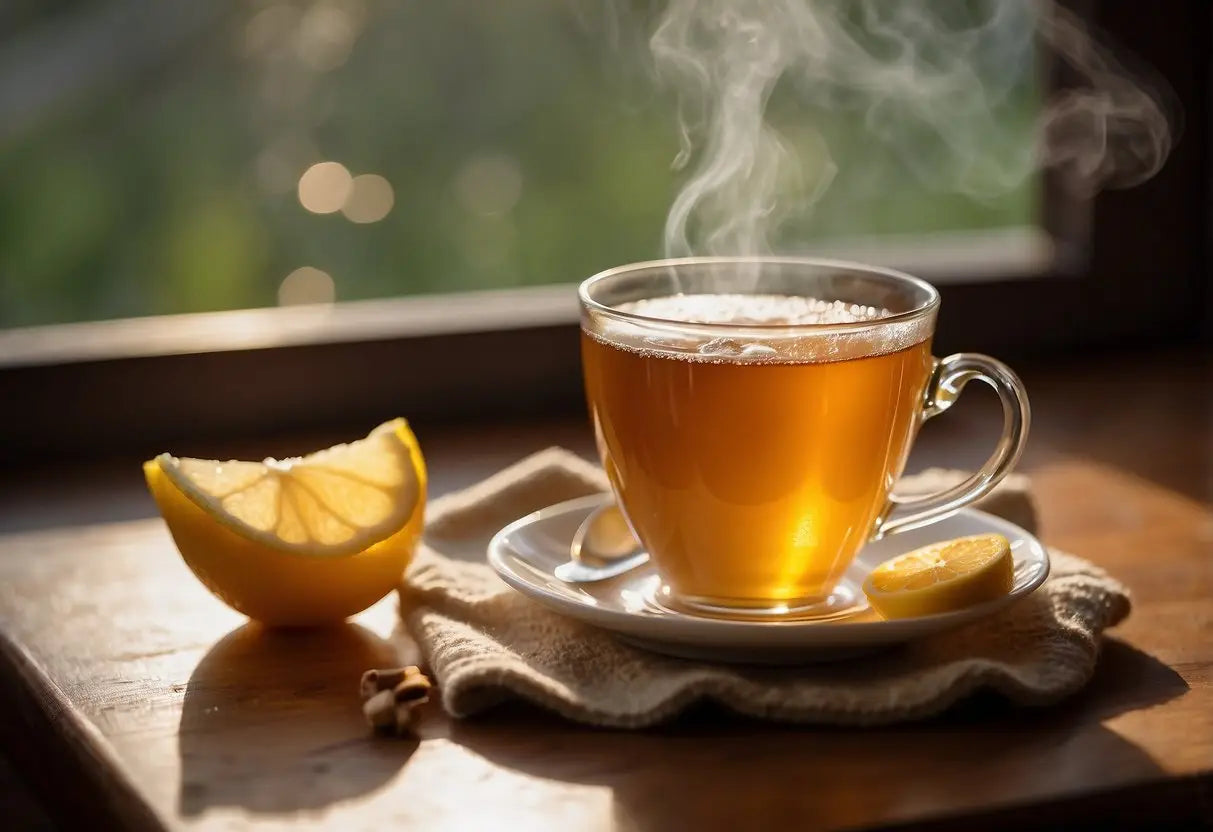
When dealing with a sore throat, it's important to balance daily tea intake and know the optimal times to consume it for maximum relief. These elements ensure both effectiveness and safety.
Daily Consumption Limits
For sore throat relief, moderate tea consumption is key. You should aim for 2-3 cups of tea per day. Exceeding this amount may lead to unwanted side effects like dehydration due to caffeine or upset stomach from certain herbal varieties.
A variety of teas, such as chamomile, peppermint, and ginger, can be beneficial. Each type has distinctive properties that aid in soothing a sore throat. Pay close attention to how your body responds and adjust your intake if needed.
If drinking herbal teas, it's best to avoid those known for their strong laxative or diuretic effects, such as senna. Monitoring your response helps maintain the balance, preventing overconsumption or adverse reactions.
Best Time to Drink Tea
Timing your tea consumption can enhance its soothing effects. Drink a cup in the morning to start your day with a gentle throat coating, especially if you experience early morning soreness. Midday tea helps maintain hydration and throat relief throughout the day.
Evening tea, particularly non-caffeinated options like chamomile or ginger, can be especially comforting before bed. These types help relax your throat muscles and promote better sleep, aiding in overall recovery.
Avoid highly caffeinated teas late in the evening to prevent sleep disruptions. Implementing a regular routine in tea consumption tailored to your daily schedule and symptoms can maximize its benefits for a sore throat.
Scientific Evidence on Tea for Throat Health
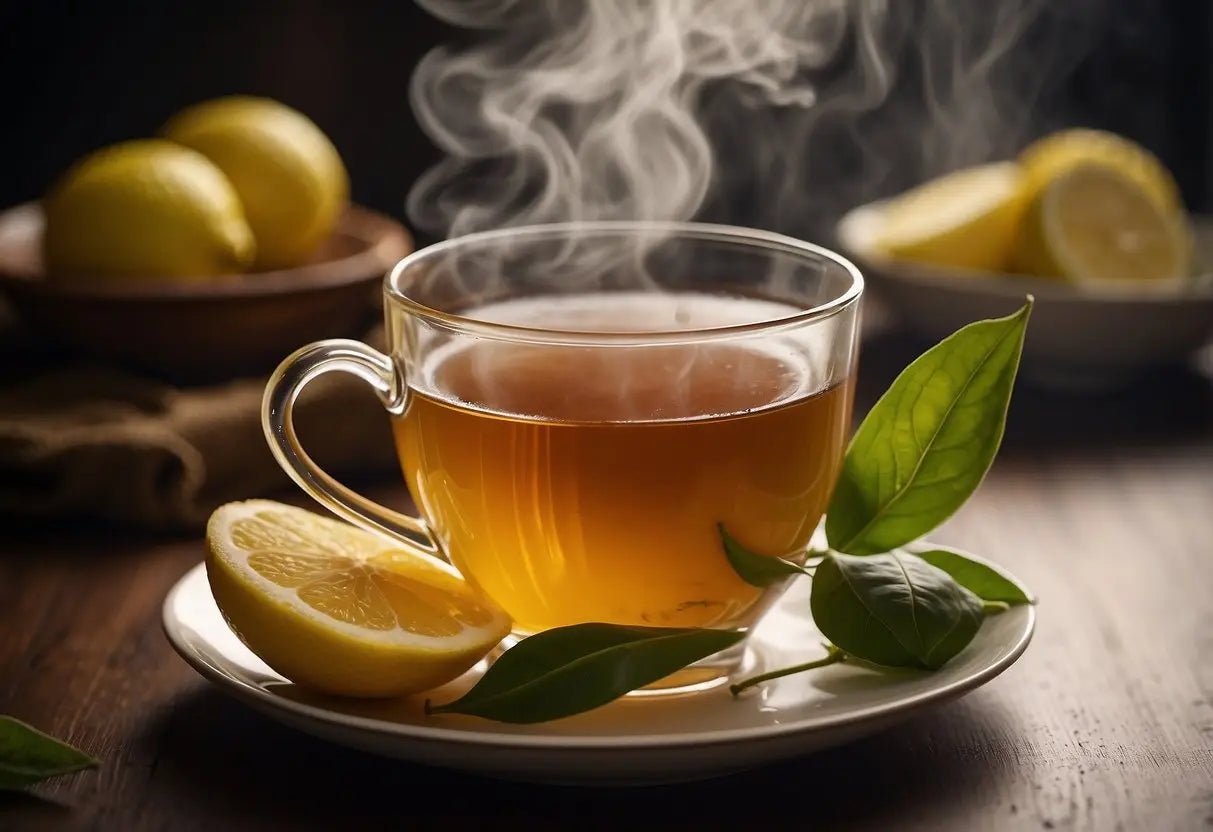
Scientific studies have explored the therapeutic potential of tea for alleviating sore throat symptoms. Key areas of focus include clinical trials and specific research findings related to different tea types and their effects.
Clinical Studies
Clinical trials have evaluated various types of tea, including herbal and green teas, for their impact on throat health. A study published in the Journal of Medicinal Food examined the efficacy of chamomile tea in reducing throat pain. Participants reported significant relief compared to a placebo group.
Another study, featured in Phytotherapy Research, investigated green tea's effect on throat discomfort. Researchers administered green tea gargles to patients, noting a decrease in throat inflammation and pain. These findings highlight the value of tea as a supportive remedy for sore throats.
Research Outcomes
Research demonstrates that tea contains compounds like polyphenols and antioxidants. These compounds have anti-inflammatory and antimicrobial properties. An Annals of Otology, Rhinology & Laryngology publication identified that the catechins in green tea can inhibit the growth of bacteria known to cause throat infections.
Herbal teas, such as licorice and slippery elm, have shown potential in soothing throat irritation. A meta-analysis in Evidence-Based Complementary and Alternative Medicine found that these herbs, when consumed as tea, provide a protective mucosal layer in the throat, reducing irritation and supporting healing.
Potential Side Effects and Precautions
When consuming tea for a sore throat, it's important to be aware of potential side effects and take necessary precautions. These can include issues related to caffeine sensitivity, interactions with herbal ingredients, and the risk of allergies or adverse reactions.
Caffeine Sensitivity
Many teas contain caffeine, which can affect individuals differently. If you are sensitive to caffeine, you may experience jitteriness, increased heart rate, or difficulty sleeping.
Symptoms might worsen if you consume large amounts of caffeinated tea. Consider opting for decaffeinated or herbal teas. Always check the caffeine content on the label to make an informed choice. Reducing your overall caffeine intake can also help mitigate these symptoms.
Herbal Interactions
Herbal teas are often used for their soothing properties, but they can interact with medications. For example, licorice root tea might increase blood pressure or interact with specific medications like blood thinners.
Always consult with a healthcare provider before drinking herbal teas, especially if you are taking prescription medicines or have pre-existing health conditions. Understanding possible interactions ensures you consume teas safely.
Allergies and Reactions
Tea ingredients can cause allergic reactions in some individuals. Common symptoms of an allergic reaction include hives, itchiness, and swelling. If you have known allergies to certain plants or herbs, read ingredient labels carefully.
Conduct a patch test by applying a small amount of tea to your skin to check for a reaction before consuming it. If symptoms arise, seek medical attention promptly. This approach helps avoid severe allergic responses.
Alternative Remedies and Complements
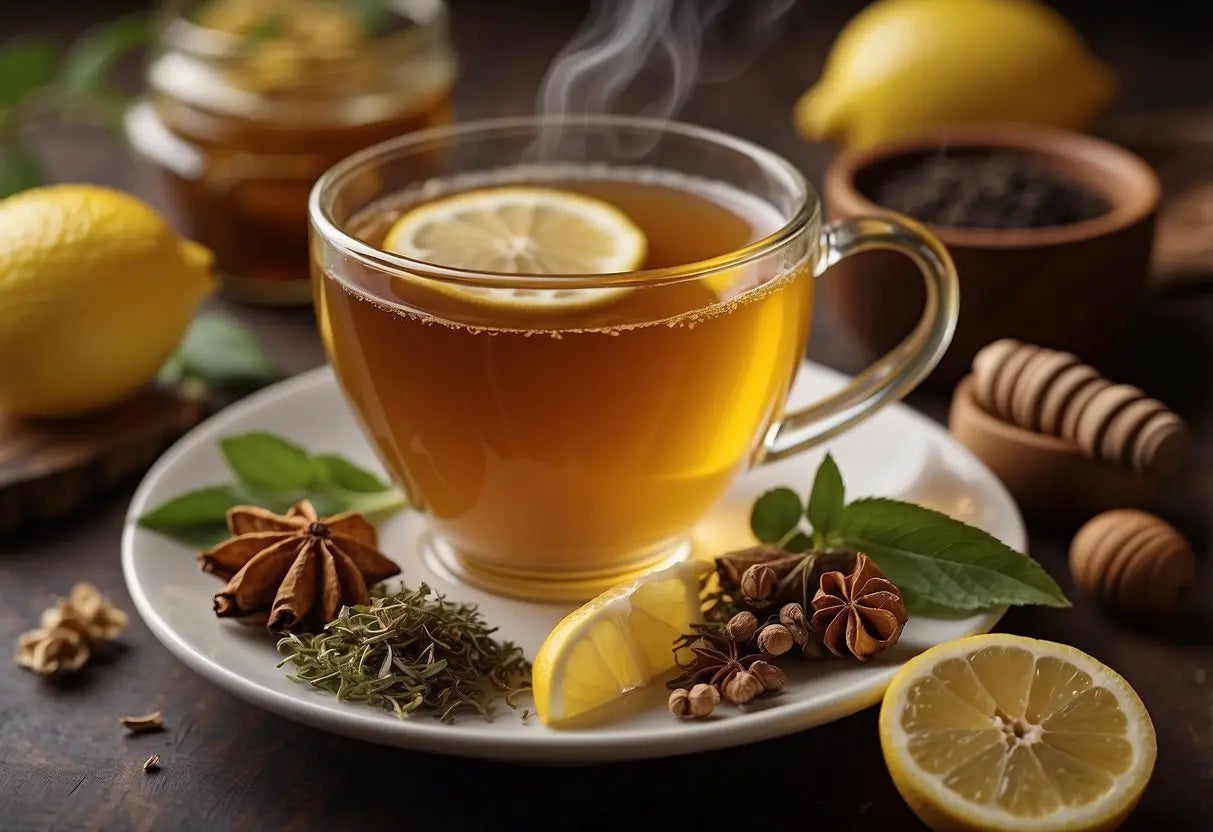
For relief from a sore throat, you can supplement tea with gargling solutions, throat lozenges, humidifiers, and by staying hydrated. Each method is effective in its own right and can bring added comfort.
Gargling Solutions
Warm saltwater gargles can reduce swelling and wash away irritants. Try mixing 1/4 to 1/2 teaspoon of salt in 8 ounces of warm water. Gargle for about 30 seconds, then spit it out. You can repeat this several times a day.
Another option is to use baking soda. Combine 1/4 teaspoon of baking soda with the saltwater mixture. This combination can also neutralize acids and kill bacteria in the throat.
Throat Lozenges
Throat lozenges can provide immediate relief by lubricating and soothing the throat. Look for lozenges containing menthol, honey, or glycerin. These ingredients help to numb the throat and reduce irritation.
Herbal lozenges with ingredients like slippery elm, licorice root, and marshmallow root can also offer natural relief. Be mindful of sugar content if you need to avoid high sugar intake.
Humidifiers
Using a humidifier adds moisture to the air, which can ease sore throat symptoms, especially in dry environments. Ensure the device is clean to prevent the spread of bacteria and mold. Aim for a humidity level between 30-50%.
A cool-mist humidifier is often recommended, but warm-mist options can also be effective. Position the humidifier close to your bed while you sleep for the best results.
Staying Hydrated
Drinking plenty of fluids keeps your throat moist and can thin mucus, making it easier to swallow. Water is essential, but herbal teas, broths, and electrolyte solutions are also beneficial.
Avoid caffeinated or alcoholic beverages as they can dehydrate you. Adding a slice of lemon or a teaspoon of honey to your drinks can offer extra soothing properties.
← Older post Newer post →











